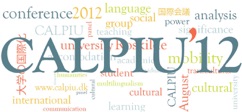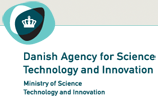Conference CALPIU’12
Roskilde, April 1-4, 2012
Conference CALPIU’12
Roskilde, April 1-4, 2012

Keynote Speakers
•François Grin, Université de Genève, Switzerland
•Andy Kirkpatrick, Griffith University, Brisbane, Australia
•Joan Turner, Goldsmiths College, University of London, Great Britain
Round Table
In addition to the keynote speakers, the conference will feature a round table of invited speakers who will present and discuss various approaches to multilingualism in the international university. The panelists are:
•Hanne Leth Andersen, Roskilde University, Denmark (University Vice President, Panel Chair)
•François Grin, Université de Genève, Switzerland
•Peter Harder, University of Copenhagen, Denmark
•David C.S. Li, Hong Kong Institute of Education, China
•Jan K. Lindström, University of Helsinki, Finland
•Jean-Jacques Weber, University of Luxembourg, Luxembourg
Call for Papers
Call for Papers is closed, but can be accessed here
Practicalities
For more information about accommodation, transport etc, please see here
Sponsors and Committees
For more information about the organisation of the conference please see here
Registration
For more information about registration, please see here
Booklet and Programme
The abstracts booklet and programme is now available for download, please see it here:
CALPIU’12 Presentation Slides
You can see the presentation slides here.
If you would like to share your slides, please send them to calpiu12@ruc.dk.
Higher education across borders: Transcultural interaction and linguistic diversity
CALPIU’12 is funded by the Danish Council for Independent Research, Humanities; John Benjamins Publishing Company and The Taylor and Francis Group

Conference Theme
CALPIU’12 is the second open conference arranged by the CALPIU Research Centre for the Study of Cultural and Linguistic Practices in the International University. The aim of CALPIU’12 is to discuss various aspects of the consequences of transnational student mobility.
Student mobility makes necessary both cultural and linguistic accommodation and learning processes. We are witnessing a huge increase in the learning of languages to be used as lingua francas by academic teachers and students, not least English, ‘the language of globalization’.
However, forces of ‘localization’, too, are manifest at every university trying to adopt internationalization strategies, the tension between the global and the local – uniformity and diversification – creating a multidimensional space for new kinds of cultural and linguistic hybridity to flourish.
There is a new open-mindedness regarding the roles and identities of self and others, leading to new patterns of linguistic/interactive, educational and social practices. We aim to further the theoretical understanding of these processes, those of active and receptive multilingualism as well as language alternation in interaction.

